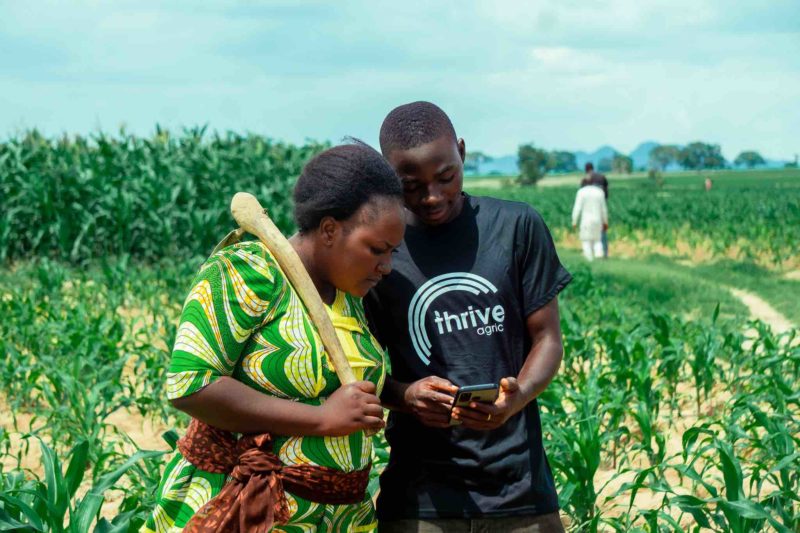Lessons from ThriveAgric: How the Agritech Platform Survived a Scare

ThriveAgric was founded by Uka Eje (CEO) and Ayodeji Arikawe (CTO) in 2017. The startup began its operations as an agricultural technology startup, providing access to finance, premium markets, and data-driven advisory. Its services were mainly for smallholder farmers.
ThriveAgric’s priority is its customers. The startup uses its platform to increase farm production and increase the financial gains of its customers. Thrive adopts a simple approach where customers can fund farms and then receive profitable returns within a specified time frame. This is usually between 6 and 9 months. Customers can earn interests as high as 15% in 6 months. Longer durations of up to 9 months attract higher interest rates of 20%.
On the other side of its service structure, ThriveAgric provides microloans to Nigerian farmers. The startup also creates channels for farmers to sell produce to large buyers like Flour mills. Thrive strives to improve farmers’ efficiency by providing seamless access to financing, agricultural best practices and a premium market for their products.
This customer-centric model attracted the attentions of Ventures Platform Fund, an Abuja-based early-stage venture capital firm, and Y Combinator, a seed-stage accelerator based in the United States, have both provided support. As a result, they earned a reputation among customers as a trustworthy agro-crowdfunding platform.
Thrive Agric’s operating model focused on solving three problems for farmers:
- limited access to capital
- Limited access to extension services
- limited access to distribution (market)
Thrive Agric addressed farmers’ financing issues by crowdfunding from individuals (mostly urban, middle-class Nigerians) and providing microloans to farmers, among other things.
Things Fall Apart
This is not Okonkwo’s story, however, things really did fall apart for Thrive Agric in 2020. The pandemic and its lockdown effect had disastrous financial consequences for farms across the country. The peak of the pandemic restricted access to farms and farming markets.
Thrive’s primary source of revenue is harvest sales from partnering farmers to off-takers. However, sales became ineffective, and as a result, the startup could meet its financial obligations to subscribers.
According to customers, because Thrive had claimed that funds were safe as all farms are duly insured by LeadWay Assurance, paying off investors’ capital should not be an issue since. Customers also claimed the Agritech startup became mute when issues of payout were brought up.
Dear Thrive Agric subscribers and partners:
By now, you may be aware that payouts for some farm subscriptions are delayed. This is an unfortunate outcome of the COVID-19 pandemic and its consequent restrictions on physical access to farms and farming markets.
— ThriveAgric (@thriveagric) October 2, 2020
Customers were drawn to the reality of their fate when LeadWay Assurance issued a statement denying that investors’ capital was insured with them. LeadWay claimed that their obligation do not cover their individual investors.
As investors continued to callout the ThriveAgric, farmers’ mourned their losses which varied depending on the size of their pens. ThriveAgric reported that there were over 400,000 mature birds with no buyers. The lack of buyers and difficulty in moving the birds during the pandemic meant that over 90% of the birds died. The losses began in April 2020 and continued until the end of the year.
ThriveAgric Lived through it
Thrive had taken responsibility of the issue and assured customers of payments. To achieve this, Thrive brought in an interim CEO, Adia Sowho, who was at the time serving as the VP of Growth and Managing Director, Nigeria, for credit platform Migo. The new team was able to enhance the startup’s transparency around the repayment schedule. It created a new payout dashboard—Payout.thriveagric.com—that reflected each retail investor’s exact repayment date.
The new structure and leadership enabled the ThriveAgric pay back the hundreds of customers using the bridge loan it secure. It did this in just 9 months. The startup was also able to repay the bridge loan in 2021.

ThriveAgric has since suspended retail investor crowdfunding in order to focus on institutional investors. The startup has formed investment partnerships with several commercial banks, the CBN, the World Food Program, and USAID since its pivot. Thrive recently raised a $56.4M debt finance, and expand into new African markets, including Ghana, Zambia, and Kenya.
Its landmark collaboration recently took the form of a one-year project in collaboration with the USAID-backed West Africa Trade & Investment Hub (Trade Hub). Trade Hub aims to empower at least 50,000 farmers across Nigeria by providing $1.75 million co-investment partnership grant. The startup is also concentrating on expanding its farmer-centric technology solutions, which currently serve over 200,000 farmers.
Ladies and gentlemen, this is a lesson from Thrive, a lesson of how they bounced back.
